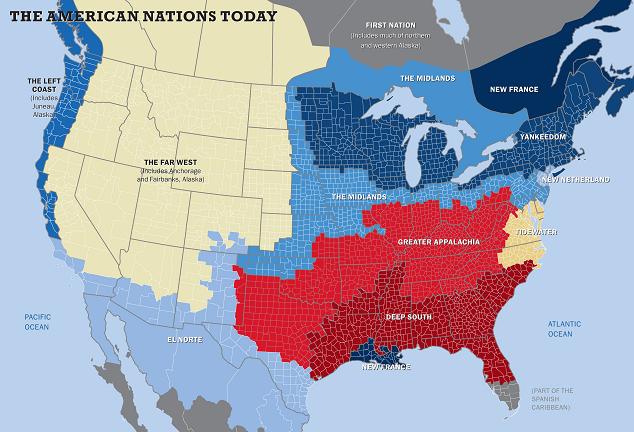
Colin Woodard's book American Nations is sort of an update to Joel Garreau's nine nations, except that his version of America goes to eleven. In a recent article he elaborates on the national differences with respect to gun violence. The key idea is that the United States is constituted of several nations, whose boundaries do not necessarily coincide with those of the States. So it is no wonder that we can't come to any sort of political consensus.

Woodard's concept of many nations within one can be combined with the political and legal theories of Philip Bobbitt. In his book The Shield of Achilles, Bobbitt portrays the evolution of the state as proceeding through periodic "epochal wars" which redefine the constitutional order. As each new form of the state is legitimized, the seeds are planted for the growth of the form which will come to replace it. Thus he describes a kind of historical cycle, to join many others which have been postulated.
In the 21st century, the advancements of high-speed computing and global telecommunications have empowered individuals, diminished the state's ability to influence the economy, and generated new security threats which are immune to the nation-state's conventional means of deterrence. As this happens, the familiar nation-state of the 20th century is giving way to what Bobbitt calls the market-state. A key difference between the two orders is that whereas the nation-state serves the welfare of the nation through public services and social safety nets, the market-state maximizes economic opportunity for its citizens, while protecting them from environmental degradation and network-infiltrating dangers such as infectious disease and terrorism. The state's role has evolved from managing the system for the benefit of the people, in competition with other states with different ideologies (the Cold War status quo), to protecting the system's perimeters while allowing the people to manage themselves in a loosely controlled consumer marketplace of global extent (the Washington Consensus and the "End of History.")
To the point made by Woodard about gun politics, the arrival of the market-state has promoted nationalist sentiment among groups that have long been subsumed within larger nation-state entities. This happens because power is diffused and smaller-scale loyalties are encouraged. Bobbitt cites the Old World examples of the rising Basque movement in Spain, and the recent separation of Scotland's Parliament from that of England. In the New World, this might fall along the lines delineated in Woodard's classification of eleven American "nations."
There are already signs of power devolving from the federal government, as states enact laws in defiance of federal law. Examples include the legalizing of marijuana, restrictions on abortion, and laws based on religious principle which limit civil rights. These assumptions of legal power by the states manifest according to positions on culture war issues which have long divided the U.S. As this phenomenon continues, the culture wars division between "red" and "blue" states might evolve into a more variegated set of legal regimes corresponding to Woodard's eleven American nations.
Probably regional blocs would emerge, becoming separate market-state power centers, with the federal government existing as a vestigial nation-state artifact with key responsibilities in security and law enforcement. The country might thus split into a northeastern blue-state bloc with liberal values and a large public sector, a southeastern red-state bloc with laws strongly influenced by Christian religion, and a western something-in-between-state bloc with a libertarian bent. The west coast and New Orleans would be independent enclaves reflecting their unique national values. There would not be a Civil War per se, more like a relatively friendly Civil Separation, but as the legal order and the locus of governmental power shift, there will occur what amounts to a new American revolution.
Or not. It could also be that the rising Millennial generation forges a new values consensus, dissolving the boundaries of the eleven nations and redefining the state of the American nation. There could still be a revolution, but one of gathering, not separation. At the time of this writing, during the 2016 presidential primaries, that generation is already showing its drive for revolution through its support for anti-establishment candidates. One can't be sure what lies ahead, but one can always speculate. (After the election and what followed, I felt obligated to re-speculate).
| Give Me Liberty | Ex Uno Plures |
| The Red-Blue Wars | DMZ |
| The Rise of Gilead | A24's Civil War |
This page copyright Steve Barrera 2016-2024